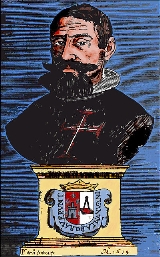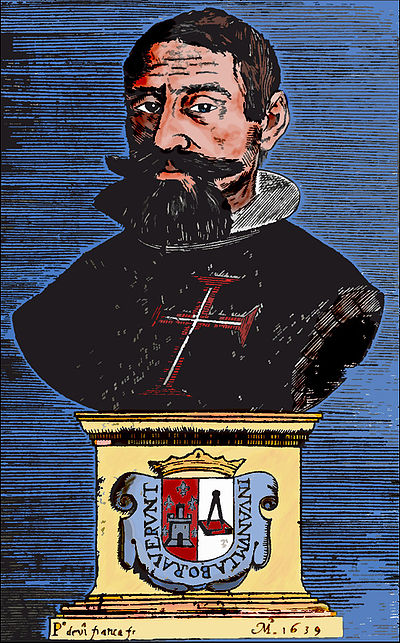
Manuel de Faria e Sousa
Encyclopedia
Manuel de Faria e Sousa was Portuguese
historian
and poet
during the period of the Iberian Union
, frequently writing in Spanish
.
 He was born of an ancient Portuguese family, probably at Pombeiro, studied in Braga
He was born of an ancient Portuguese family, probably at Pombeiro, studied in Braga
for some years, and when about fourteen entered the service of the Bishop of Porto. With the exception of about four years, from 1631 to 1634, during which he was a member of the Portuguese embassy in Rome
, the greater part of his later life was spent at Madrid
, and there he died, after much suffering, in June 1649.
He was a laborious, peaceful man; and a happy marriage with Catarina Machado, the "Albania" of his poems, enabled him to lead a studious domestic life, dividing his cares and affections between his children and his books. His first important work, an Epitome de las historias Portuguezas (Madrid, 1628), was favorably received; but some passages in his enormous commentary upon Portuguese epic Os Lusíadas
, the poem of Luís de Camões
, excited the suspicion of the inquisitors, caused his temporary incarceration, and led to the permanent loss of his official salary. In spite of the enthusiasm which is said to have prescribed to him the daily task of twelve folio pages, death overtook him before he had completed his greatest enterprise, a history of the Portuguese in all parts of the world.
Several portions of the work appeared at Lisbon after his death, under the editorship of Captain Faria e Sousa : Europa Portugueza (1667, 3 vols.); Ásia Portugueza (1666-1675, 3 vols.); África Portugueza (1681). As a poet Faria e Sousa was nearly as prolific; but his poems are vitiated by the prevailing Gongorism of his time. They were for the most part collected in the Noches claras (Madrid, 1624-1626), and the Fuente de Aganipe, of which four volumes were published at Madrid in 1644-1646. He also wrote, from information supplied by P. A. Semmedo, Imperio de China i cultura evangelica en ~l (Madrid, 1642); and translated and completed the Nobiliário of the Count of Barcelos
.
There are English translations by J. Stevens of the History of Portugal (London, 1698), and of Portuguese Asia (London, 1695).
1a : 600 sonetos
2a : 12 "poemas em outava rythma, silvas e sextinas[1]"
3a : canções, odes, madrigaes, sextinas e tercetos
4a : 20 eclogas
5a : redondilhas, glosas, cantilenas, decimas, romances e epigramas
6a : "Musa nueva" com sonetos, oitavas, tercetos, canções, etc. reduzidos a versos octosilabos
7a : "Engenho" de acrostichos, esdrúxulos, ecos, etc.
Is the same work amplified later with the title of Europa portuguesa.
Say Faria, That begins this work in 1614, using 25 years, examining more than thousand authors, and between this ones 300 Italians.
1° Lisboa, Henrique Valente de Oliveira, 1666 : History of Índia, since it discovery until 1538.
2° Lisboa, Antonio Craesbeeck de Mello, 1674 : History of Índia, from 1538 to 1581
3° Lisboa, ibidem, 1675 : History of Índia, during the spanish dominion (1581 - 1640).
1° Lisboa, Antonio Craesbeeck de Mello, 1678 : From universal diluvio to Portugal with king.
2° Lisboa, Ibid, 1679 : From Government of Count D. Henrique to D. João III.
3° Lisboa, Ibid, 1680 : From king D. Sebastião to Filipe III of Portugal.
Portugal
Portugal , officially the Portuguese Republic is a country situated in southwestern Europe on the Iberian Peninsula. Portugal is the westernmost country of Europe, and is bordered by the Atlantic Ocean to the West and South and by Spain to the North and East. The Atlantic archipelagos of the...
historian
Historian
A historian is a person who studies and writes about the past and is regarded as an authority on it. Historians are concerned with the continuous, methodical narrative and research of past events as relating to the human race; as well as the study of all history in time. If the individual is...
and poet
Poet
A poet is a person who writes poetry. A poet's work can be literal, meaning that his work is derived from a specific event, or metaphorical, meaning that his work can take on many meanings and forms. Poets have existed since antiquity, in nearly all languages, and have produced works that vary...
during the period of the Iberian Union
Iberian Union
The Iberian union was a political unit that governed all of the Iberian Peninsula south of the Pyrenees from 1580–1640, through a dynastic union between the monarchies of Portugal and Spain after the War of the Portuguese Succession...
, frequently writing in Spanish
Spanish language
Spanish , also known as Castilian , is a Romance language in the Ibero-Romance group that evolved from several languages and dialects in central-northern Iberia around the 9th century and gradually spread with the expansion of the Kingdom of Castile into central and southern Iberia during the...
.

Braga
Braga , a city in the Braga Municipality in northwestern Portugal, is the capital of the Braga District, the oldest archdiocese and the third major city of the country. Braga is the oldest Portuguese city and one of the oldest Christian cities in the World...
for some years, and when about fourteen entered the service of the Bishop of Porto. With the exception of about four years, from 1631 to 1634, during which he was a member of the Portuguese embassy in Rome
Rome
Rome is the capital of Italy and the country's largest and most populated city and comune, with over 2.7 million residents in . The city is located in the central-western portion of the Italian Peninsula, on the Tiber River within the Lazio region of Italy.Rome's history spans two and a half...
, the greater part of his later life was spent at Madrid
Madrid
Madrid is the capital and largest city of Spain. The population of the city is roughly 3.3 million and the entire population of the Madrid metropolitan area is calculated to be 6.271 million. It is the third largest city in the European Union, after London and Berlin, and its metropolitan...
, and there he died, after much suffering, in June 1649.
He was a laborious, peaceful man; and a happy marriage with Catarina Machado, the "Albania" of his poems, enabled him to lead a studious domestic life, dividing his cares and affections between his children and his books. His first important work, an Epitome de las historias Portuguezas (Madrid, 1628), was favorably received; but some passages in his enormous commentary upon Portuguese epic Os Lusíadas
Os Lusíadas
Os Lusíadas , usually translated as The Lusiads, is a Portuguese epic poem by Luís Vaz de Camões ....
, the poem of Luís de Camões
Luís de Camões
Luís Vaz de Camões is considered Portugal's and the Portuguese language's greatest poet. His mastery of verse has been compared to that of Shakespeare, Vondel, Homer, Virgil and Dante. He wrote a considerable amount of lyrical poetry and drama but is best remembered for his epic work Os Lusíadas...
, excited the suspicion of the inquisitors, caused his temporary incarceration, and led to the permanent loss of his official salary. In spite of the enthusiasm which is said to have prescribed to him the daily task of twelve folio pages, death overtook him before he had completed his greatest enterprise, a history of the Portuguese in all parts of the world.
Several portions of the work appeared at Lisbon after his death, under the editorship of Captain Faria e Sousa : Europa Portugueza (1667, 3 vols.); Ásia Portugueza (1666-1675, 3 vols.); África Portugueza (1681). As a poet Faria e Sousa was nearly as prolific; but his poems are vitiated by the prevailing Gongorism of his time. They were for the most part collected in the Noches claras (Madrid, 1624-1626), and the Fuente de Aganipe, of which four volumes were published at Madrid in 1644-1646. He also wrote, from information supplied by P. A. Semmedo, Imperio de China i cultura evangelica en ~l (Madrid, 1642); and translated and completed the Nobiliário of the Count of Barcelos
Barcelos
Barcelos Municipality is located in Braga District, in the north of Portugal. It has a total population of 123,831 and an area of 378.9 km². With 89 parishes, it is the municipality with the highest number of parishes in the country, as well as the city of Barcelos...
.
There are English translations by J. Stevens of the History of Portugal (London, 1698), and of Portuguese Asia (London, 1695).
Works
- Muerte de Jesus y llanto de Maria. Madrid, 1623
- Fabula de Narciso e Echo. Lisboa, 1623. In Portuguese
- Divinas e humanas flores. Madrid, por Diego Flameco 1624
- Noches claras. Madrid, por Diego Flameco 1624
- Fuente de Aganipe y Rimas varias. Madrid, por Diego Flamengo 1624, 1625, 1626. In Portuguese and Spanish. In seven parts:
1a : 600 sonetos
2a : 12 "poemas em outava rythma, silvas e sextinas[1]"
3a : canções, odes, madrigaes, sextinas e tercetos
4a : 20 eclogas
5a : redondilhas, glosas, cantilenas, decimas, romances e epigramas
6a : "Musa nueva" com sonetos, oitavas, tercetos, canções, etc. reduzidos a versos octosilabos
7a : "Engenho" de acrostichos, esdrúxulos, ecos, etc.
- Epithalamio de los casamientos de los señores Marqueses de Molina. Saragoça, 1624
- Epitome de las historias portuguesas. Madrid, por Francisco martinez 1628
Is the same work amplified later with the title of Europa portuguesa.
- Escuriale por Jacobum Gibbes Anglum. Madrid, 1658. tradução em castelhano duma descrição do Escurial em latim.
- Lusiadas de Luis de Camoens, principe de los poetas de España. Comentadas. Madrid, por Juan Sanches, 1639.
Say Faria, That begins this work in 1614, using 25 years, examining more than thousand authors, and between this ones 300 Italians.
- Informacion a favor de Manuel de faria y sousa etc., 1640
- Peregrino instruido
- Imperio de la China e cultura evangelica en el, etc.
- Nenia : poema acrostico a la reyna de España D. Isabel de Bourbon. Madrid, 1644
- Nobiliario del Conde de Barcellos D. Pedro, hijo delrey D. Dionis de Portugal, traducido etc. Madrid, 1646
- El gran justicia de Aragon Don Martin Baptista de Lanuza. Madrid, 1650
- Asia Portuguesa. 3 tomos :
1° Lisboa, Henrique Valente de Oliveira, 1666 : History of Índia, since it discovery until 1538.
2° Lisboa, Antonio Craesbeeck de Mello, 1674 : History of Índia, from 1538 to 1581
3° Lisboa, ibidem, 1675 : History of Índia, during the spanish dominion (1581 - 1640).
- Europa Portuguesa. 3 tomos :
1° Lisboa, Antonio Craesbeeck de Mello, 1678 : From universal diluvio to Portugal with king.
2° Lisboa, Ibid, 1679 : From Government of Count D. Henrique to D. João III.
3° Lisboa, Ibid, 1680 : From king D. Sebastião to Filipe III of Portugal.
- África Portuguesa. Lisboa, Antonio Craesbeeck de Mello, 1681 : History of conquest from D. João I to year 1562.
- Rimas varias de Luis de Camoens, etc. comentadas. Lisboa, Theotonio Damaso de Mello, 1685.

